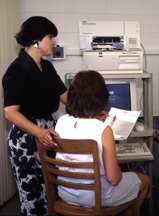 Purdue News
Purdue News
 Purdue News
Purdue News

|
|
December 2000 Purdue center to lead national research
|

|
Additional expertise will be provided by faculty at the University of Illinois and the Indiana University School of Medicine.
"The need for this research is clear," said Purdue Professor Connie Weaver, the director of the new center. "More than 16 million Americans use dietary supplements, but more needs to be learned about their safety and effectiveness.
"Marketers of these products face less regulatory oversight than required for food additives and drugs. The problem is compounded by the fact that the burden of proof rests on the shoulders of the Food and Drug Administration, not the manufacturers."
The center's role, however, goes beyond testing, she said.
"Our mission is also to communicate our findings with the public and the medical community and to train students, postdoctoral fellows, faculty and industry scientists about this field of research," Weaver said.
At Purdue, soy products and ingredients will be tested for their ability to replace estrogen and protect against bone loss in postmenapausal women. Compounds in green tea will be tested for their ability to inhibit tumor growth.
"Once we understand the mechanisms at work, we will attempt to create 'designer botanicals' and then test those for their anticancer properties," Weaver said.
At Alabama, the center's associate director, pharmacology Professor Stephen Barnes, will lead research into the ability of botanicals to inhibit inflammation that is characteristic of many chronic diseases, including cardiovascular disease. Other Alabama researchers will study products prepared from grapes and berries, looking to see how they might reach the brain and protect the nerves against oxidative stress damage that leads to the loss of cognitive function during aging.
NIH reviewers said they were attracted to the Purdue proposal because it was "creative and innovative," combining world-class expertise and technology.
"Certainly it was significant that Varro Tyler, Purdue distinguished professor emeritus of pharmacognosy, will serve as senior advisor to our team," Weaver said. "He is one of the leading experts worldwide on dietary supplements and the senior author of the only American textbook on natural drugs."
Weaver, a distinguished professor and head of the Purdue Department of Foods and Nutrition, is the past president of the American Society for Nutritional Sciences and was a panel member of the National Academy of Sciences Food and Nutrition Board for setting calcium requirements for North America. She is a widely recognized authority on nutritional supplements and their relationship to osteoporosis.
The proposal also takes advantage of the analytical expertise of a company in the Purdue Research Park, Bioanalytical Systems Inc., and Purdue's PRIME Lab, a one-of-a-kind rare isotope laboratory. The PRIME Lab's accelerator mass spectrometer will allow researchers to monitor bone loss in 50 days that otherwise would take two to four years, Weaver said.
"For our osteoporosis study, for example, we'll be able to use just nine people and test them for seven different products in two years," Weaver said. "Without the PRIME lab, it would take two years to test just one product."
Weaver, who takes no dietary supplements, said she does not necessarily expect to find magic cures.
"If we do, that's fine," Weaver said. "But just as significantly, we will learn a lot about the mechanisms of disease and potential treatments, not necessarily just about botanicals," she said.
Industry also may benefit.
"We'll also be looking for ways to transfer our discoveries into the marketplace," Weaver said. "In Indiana, there already are several botanical growers and companies that use botanical products. This research may benefit them or provide the basis for new enterprises."
The research will involve Purdue faculty in four areas: the Department of Foods and Nutrition, within the School of Consumer and Family Sciences; the Department of Physics and Department of Statistics within the School of Science; the Department of Medicinal Chemistry and Molecular Pharmacology within the School of Pharmacy and Pharmacal Sciences; and the Department of Veterinary Clinical Studies in the School of Veterinary Medicine. A former faculty member in the Department of Horticulture within the School of Agriculture also will serve as a collaborator on research.
The center will become the second NIH center based at Purdue; the other is the cancer center. The Purdue botanical center is one of only four in the country funded by NIH for the study of dietary supplements. The others are at the University of California at Los Angeles, the University of Illinois at Chicago, and the University of Arizona.
Funding is provided by the Office of Dietary Supplements at the National Institutes of Health, in collaboration with the National Center for Complementary and Alternative Medicine.
Source: Connie Weaver, (765) 494-8231, weavercm@cfs.purdue.edu
Writer: Jeanne V. Norberg, (765) 494-2084; jnorberg@purdue.edu
Other sources:
Stephen Barnes, (205) 934-7117, Stephen.barnes@pharmtox.uab.edu
Christine Swanson, National Institutes of Health Office of Dietary Supplements, (301) 435-2920
Related Web sites:
Purdue Cancer Center:
PHOTO CAPTION:
Connie Weaver, left, head of the Department of Foods and Nutrition at Purdue University, works with a student in her research lab. (Purdue News Service Photo by David Umberger)
A publication-quality photograph is available at the News Service Web site and at the ftp site. Photo ID: Weaver.nihcenter
 To the Purdue News and Photos Page
To the Purdue News and Photos Page